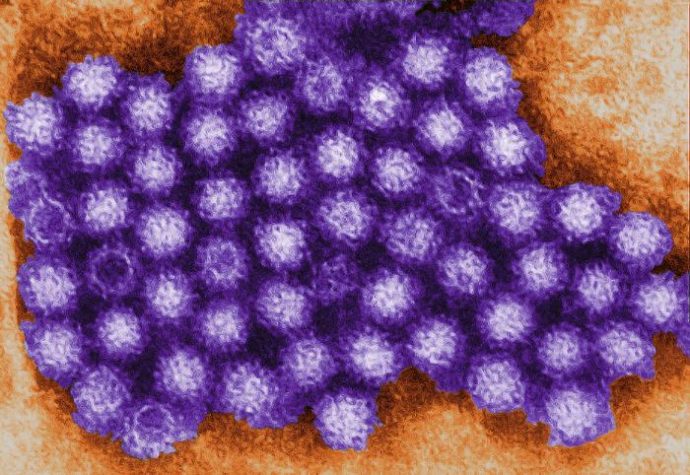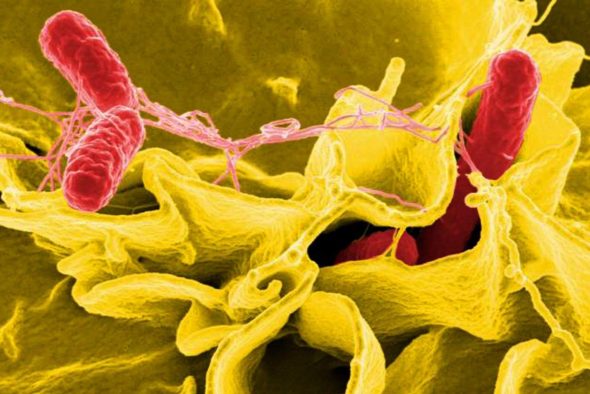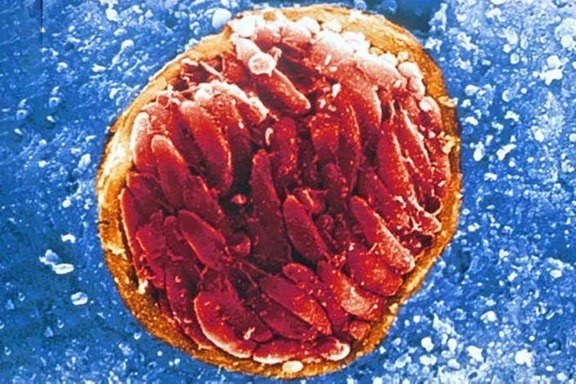Norovirus
Norovirus is the biggest cause of gastrointestinal infection in the UK and is highly infectious. It is also known as the winter vomiting bug, although you can catch it at any time of year. It is usually spread from person to person but sometimes people become infected through eating contaminated food and many outbreaks have been caused by infected food handlers.
Symptoms usually start suddenly after 1-2 days infection and include gastroenteritis, diarrhoea, vomiting, projectile vomiting and fever. There are many different types of norovirus so people can become infected more than once.


People can also become infected with Norovirus from eating oysters and other shellfish. Oysters feed on microbes such as plankton by filtering the water through themselves but virus particles can also accumulate and these can remain infectious. The virus gets into the water through faecal contamination that can originate from improper treatment of sewage.
Norovirus is very infectious, and it is thought that only 10 virus particles are needed to cause disease. Alcohol hand gels do not kill norovirus and hand washing is the best way to stop the virus spreading and infecting other people. Norovirus can survive in the environment for several months.
Hepatitis A
The hepatitis A virus infects the liver and causes symptoms that include tiredness, fever, nausea, vomiting, loss of appetite, joint pain, abdominal pain and itchy skin, through to hepatitis and rarely liver failure. Another symptom is jaundice, which is a yellowing of the skin and eyes. This is due to high levels of bilirubin, which is normally metabolised (broken down) by the liver. This can also cause pale stools (poo) and darkened urine. Severity of hepatitis A infection tends to increase with age.
Hepatitis A is spread by contaminated faeces and the most common route of infection in the UK is through the consumption of food that is contaminated by somebody who has not washed their hands properly. Like norovirus, the hepatitis A virus can also accumulate in shellfish and cause disease if the shellfish is undercooked or raw. Food which has been washed in contaminated water has also been associated with outbreaks. The virus is easily spread from person to person so infected people are advised to follow good hygiene measures including regular handwashing and avoiding contact with other people until at least a week after the start of symptoms. Once you have recovered from Hepatitis A, you have lifelong immunity and cannot become infected again.


Hepatitis E
Hepatitis E virus is also known as HEV and it causes hepatitis E infection. Both humans and animals can be infected by HEV. Symptoms of infection with hepatitis E virus are similar to hepatitis A infection. Infections are usually mild and do not last long and infections can also be asymptomatic (no symptoms). The disease can however be serious in people who have weakened immune systems and can even lead to liver failure.
Animals can also be infected with the hepatitis E virus and in the UK people have been infected through the consumption of raw or undercooked pork meat or offal as well as venison, wild boar and shellfish. It is advised that pork, pork products and offal should be thoroughly cooked until the thickest part of the meat reaches at least 75°C or it is steaming hot all the way through, the meat is no longer pink and the juices run clear.
Because hepatitis A and hepatitis E can spread through contaminated human sewage they are most common in countries with poor sanitation.
Read also

Foodborne pathogens
How to reduce the risk
To lower the risk of infection and protect you and your family against infectious foodborne disease there are certain things you can do in your own kitchen.

Foodborne pathogens
Foodborne bacteria
Many different types of bacteria can cause foodborne disease. Currently, the most important foodborne bacteria in Scotland are Campylobacter, Salmonella, Listeria and E. coli O157.

Foodborne pathogens
Foodborne protozoa
Protozoa are single celled parasites that can occur in food or drink and cause disease.